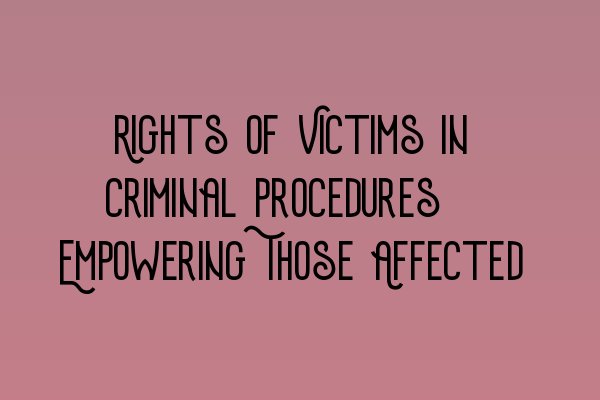Rights of Victims in Criminal Procedures: Empowering Those Affected
Being a victim of a crime can be a traumatic and distressing experience. The criminal justice system aims to not only hold perpetrators accountable but also to provide support and protection for the victims. The rights of victims in criminal procedures play a vital role in ensuring their empowerment and access to justice.
Understanding the Rights of Victims
Victims of crime have certain fundamental rights that ensure their participation in the criminal justice process. These rights encompass various aspects, such as:
- Right to be Informed: Victims have the right to be informed about the progress of their case, including important updates, court dates, and the outcome of the proceedings. This ensures transparency and helps victims stay informed and prepared throughout the legal process. You can read more about this in our article on Updates in UK Criminal Laws: Staying Informed and Prepared.
- Right to be Heard: Victims have the right to be heard and to have their views, concerns, and experiences taken into account. This includes the opportunity to provide a victim impact statement, which allows victims to express the emotional, physical, and financial impact of the crime on their lives.
- Right to Protection: Victims are entitled to protection from potential harm or intimidation. This may involve protective measures, such as restraining orders, ensuring the victim’s identity remains confidential, or providing safe spaces during court proceedings.
- Right to Support: Victims have the right to access support services, such as counseling, legal advice, and guidance throughout the legal process. These support services aim to assist victims in dealing with the aftermath of the crime and help them navigate the complexities of the criminal justice system. To learn more about enhancing your SQE criminal law study group experience, check out our article on Enhancing Your SQE Criminal Law Study Group Experience.
The Importance of Victim Participation
Victim participation in criminal procedures is crucial for several reasons:
- Enhanced Trust in the Justice System: When victims are informed, heard, and supported throughout the process, it instills trust in the criminal justice system. Victims feel respected and validated, which positively impacts their perception of the fairness and effectiveness of the legal proceedings.
- Improved Outcomes: Victim participation can lead to improved outcomes in criminal cases. By allowing victims to share their experiences and perspectives, relevant evidence and information can be presented to the court, helping to establish a fair and accurate account of the crime.
- Promoting Healing and Closure: The criminal justice process can be both emotionally and psychologically challenging for victims. However, when victims are given the opportunity to be heard and receive support, it can aid in their healing process and promote a sense of closure.
Ensuring the Rights of Victims
To ensure the effective implementation of victims’ rights, it is essential for criminal law practitioners to be well-versed in their obligations. This can be achieved through continuous professional development and staying up-to-date with changes in criminal laws. Our workshops and seminars on criminal practice are designed to expand your expertise and provide you with the necessary knowledge to effectively advocate for victims’ rights. Learn more about them in our article on Workshops and Seminars on Criminal Practice: Expanding Your Expertise.
Furthermore, it is critical for criminal law practitioners to work in collaboration with support services and organizations that specialize in assisting victims of crime. By forming partnerships and referring victims to these support networks, practitioners can ensure that victims receive the necessary guidance and care throughout the criminal justice process.
Conclusion
The rights of victims in criminal procedures are fundamental in empowering those affected by crime. By recognizing and upholding these rights, we can ensure that victims have a voice, receive the necessary support, and actively participate in the criminal justice process. Together, we can work towards a justice system that not only holds offenders accountable but also promotes the healing and well-being of victims.
To learn more about the legal protections and support available to victims, check out our article on Ensuring Rights of Victims in Criminal Procedures: Legal Protections and Support. For a detailed analysis of criminal evidence rules, read our article on Decoding Criminal Evidence Rules: A Detailed Analysis.
